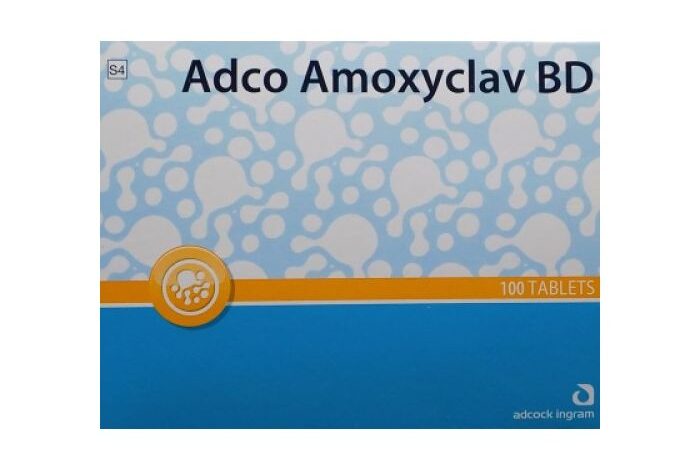Adco Amoxyclav: Uses, How it works, Dosage, Side Effects, Interactions

What is Adco Amoxyclav and what is it used for?
Adco Amoxyclav is a combination medication containing amoxicillin and clavulanic acid used to treat certain infections caused by bacteria, including infections of the ears, lungs, sinus, skin, and urinary tract. Amoxicillin is in a class of medications called penicillin-like antibiotics. It works by stopping the growth of bacteria. Clavulanic acid is in a class of medications called beta-lactamase inhibitors. It works by preventing bacteria from destroying amoxicillin.
Adco Amoxyclav also is used sometimes to treat certain sexually transmitted diseases (STD). Talk to your doctor about the possible risks of using this medication for your condition. However, this medication will not work for colds, flu, or other viral infections. Using antibiotics when they are not needed increases your risk of getting an infection later that resists antibiotic treatment.
How does Adco Amoxyclav work?
The amoxicillin part of Adco Amoxyclav works by interfering with the ability of bacteria to form cell walls. It allows holes to appear in the bacterial cell walls and this kills the bacteria causing the infection.
Some types of bacteria have become resistant to penicillin-type antibiotics, because they have developed the ability to produce defensive chemicals called beta-lactamases that stop the antibiotics from working. The clavulanic acid part of Adco Amoxyclav is a beta-lactamase inhibitor. It stops bacteria from inactivating the amoxicillin, so it increases the range of bacteria that amoxicillin can kill.
Dosage: how do you take Adco Amoxyclav and how often?
The dose of Adco Amoxyclav that’s prescribed and how long you need to take it for depends on what infection is being treated, age, weight and kidney function. Always follow the instructions given by your doctor. These will be printed on the label that your pharmacist has put on the packet of medicine.
• The usual dose of Adco Amoxyclav is 1 tablet (either 375mg or 625mg) taken 3 times a day. But follow the instructions given by your doctor. Space the doses evenly over the day.
• Adco Amoxyclav can be taken either with or without food, on a full or empty stomach. If you find it upsets your stomach, taking it with food may help.
• Try to drink plenty of fluids while you’re taking Adco Amoxyclav.
• Adco Amoxyclav tablets should be swallowed whole with a drink.
• Bottles of suspension should be shaken before measuring out a dose. Only use the measuring spoon or oral syringe provided with the suspension. Don’t use a regular teaspoon or tablespoon to give the medicine, as this will not give an accurate dose.
The dose may be lower for children. The doctor will use your child’s weight to work out the right dose for them.
What if I miss a dose?
If you miss a dose, take it as soon as you remember. If it is near the time of the next dose, skip the missed dose and resume your usual dosing schedule. Do not double the dose to catch up.
Can You overdose on Adco Amoxyclav?
Yes, if overdose is suspected, contact your local poison control center or emergency room immediately. US residents can call the US national poison hotline at 1-800-222-1222. Canadian residents should call their local poison control center directly. Symptoms of Adco Amoxyclav overdose may include severe stomach/abdominal pain, severe vomiting, persistent diarrhea, a severe decrease in the amount of urine, or seizures.
What are the side effects of Adco Amoxyclav?
Adco Amoxyclav can cause mild or serious side effects. The following list contains some of the key side effects that may occur while taking Adco Amoxyclav. This list does not include all possible side effects.
More common side effects
The more common side effects of Adco Amoxyclav include:
• diarrhea
• nausea
• skin rash
• vaginitis (caused by problems such as yeast infection)
• vomiting
These side effects may go away within a few days or a couple of weeks. If they’re more severe or don’t go away, talk to your doctor or pharmacist.
Serious side effects
Call your doctor right away if you have serious side effects. Call 911 if your symptoms feel life-threatening or if you think you’re having a medical emergency.
Serious side effects and their symptoms can include the following:
• Liver problems. It’s not common, but some people who take Adco Amoxyclav can develop liver damage. This seems to be more common in seniors and those who take Adco Amoxyclav for a long time. Usually these problems go away when the medication is stopped, but in other cases, they may be severe and require treatment. Tell your doctor if you develop symptoms of liver problems while taking Adco Amoxyclav. Your doctor may do blood tests to check for liver damage. Symptoms can include:
o stomach pain
o fatigue
o yellowing of your skin or the whites of your eyes
• Intestinal infection. Some people who take antibiotics, including Adco Amoxyclav, can develop an intestinal infection called Clostridium difficile. Tell your doctor if you develop symptoms of this infection. Symptoms can include:
o severe diarrhea that doesn’t go away
o stomach pain or cramping
o nausea
o blood in your stool
• Allergic reaction. Serious allergic reactions can occur in some people who take Adco Amoxyclav. This is more likely to happen in people with a penicillin allergy. You may not be able to take this medication again if you’ve ever had a serious allergic reaction to it. Taking it again could be fatal. If you’ve had a reaction to this medication in the past, talk to your doctor before taking it again. Symptoms of an allergic reaction can include:
o severe skin rash
o hives
o swelling of the lips, tongue, throat
o trouble breathing
Rash
Many medications, including Adco Amoxyclav, can cause rash in some people. This is a common side effect of Adco Amoxyclav, which is a penicillin-type antibiotic. This class of antibiotics causes skin rash more often than most other kinds of antibiotics.
Rash occurs in about 3 percent of people who take Adco Amoxyclav.
Raised, itchy, white, or red bumps that occur after the first couple doses of Adco Amoxyclav may indicate an allergy to the medication. If this occurs, contact your doctor. If you have an allergic reaction, you may need to be treated with a different antibiotic.
Rashes that develop several days after you take the medication and appear as flat, red patches often indicate a different kind of rash that’s not caused by an allergic reaction. These usually go away on their own after a few days.
Fatigue
Fatigue is not a common side effect of Adco Amoxyclav. However, it’s common for people who are fighting infections to feel fatigued, tired, or weak. If you become fatigued after starting Adco Amoxyclav, or your symptoms are not improving, talk to your doctor.
Yeast infection
Vaginal yeast infections can sometimes occur after treatment with antibiotics, including Adco Amoxyclav. If you’ve never had a yeast infection before and think you might have one, see your doctor for a diagnosis and treatment.
Side effects in children
Children who take Adco Amoxyclav can experience the same side effects as adults.
In addition to those side effects, children can experience tooth discoloration. Adco Amoxyclav use can cause a brown, gray, or yellow staining of children’s teeth. In most cases, brushing or dental cleaning can reduce or remove discoloration.
What other drugs will affect Adco Amoxyclav?
Tell your doctor about all your other medicines, especially:
• allopurinol;
• probenecid; or
• a blood thinner –warfarin, Coumadin, Jantoven.
This list is not complete. Other drugs may affect amoxicillin and clavulanate potassium, including prescription and over-the-counter medicines, vitamins, and herbal products. Not all possible drug interactions are listed here.
Where can I get more information?
Your pharmacist can provide more information about amoxicillin and clavulanate potassium.





